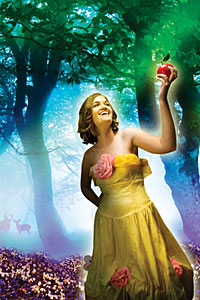Faithfully Ever After
Once upon a time, in an oceanside kingdom called Malibu, there lived a fair maiden named Caitlin Lawrence (08).
Caitlin Lawrence Finds Faith Among the Fairy Tales

Once upon a time, in an oceanside kingdom called Malibu, there lived a fair maiden named Caitlin Lawrence (’08). By day she pursued her bachelor’s degree in communications at Seaver College, but at night her mind would wander, pondering the similarities between her Christian faith and the themes of her favorite fairy tales.

“There are so many parallels between fairy tales and aspects of Christianity,” Lawrence explains. “For example, there are elements of pursuit, disguised identities, and revealed truths. There are tales about death and resurrection, and there’s a focus on redemption. A lot of the central themes have very spiritual messages.”
Now Lawrence is bringing her two passions together as a graduate student in organizational communications at Seaver College. Her thesis explores the themes that persist in both Christianity and fairy tales, a connection she first began noticing as a teenager in Seattle, Washington.
“I was leading a Bible study for young women, studying female characters in the Bible,” she says. “The first day we were studying Eve, and every time I read about Eve biting the fruit I had a mental picture of Snow White biting into the apple. After that, when we studied a different woman in the Bible I would think of what fairy tale she related to.”
In her thesis, Lawrence critically examines Cinderella as the ultimate fairy tale of hope and virtue triumphing over evil and adversity. “I explore the concept of how Cinderella always runs from the prince. I look to that as a parallel in my life of how I run from God in my relationship with him. Part of me still won’t believe that God will accept me as I am—in my rags, so to speak,” she says.
Steven Lemley (’66, MA ’70), an associate professor of communication at Seaver College, is overseeing Lawrence’s creative choice of thesis topic. “Caitlin is examining the way in which great truths are communicated in fantasy literature through an empirical survey methodology,” he says. “She will contribute to our understanding of great fantasy writers like C. S. Lewis and J. R. R. Tolkien who, among others, did their work from a Christian perspective, and how they affected imagination and values.”
Lawrence’s “empirical survey methodology” has included a three-part convocation series at Pepperdine for female students. The sessions attracted over 150 young women who studied a devotional written by Lawrence, watched film clips of Disney’s Cinderella, and took part in a data survey analyzing students’ openness to religion, self-esteem levels, and the fairy tale theme. “I’m trying to test if women internalize spiritual messages about God more after they read a fairy tale,” she explains.
Every time I read about Eve biting the fruit I had a mental picture of Snow White biting into the apple. After that, when we studied a different woman in the Bible I would think of what fairy tale she related to.
- Caitlin Lawrence
Seaver College junior Laura Fehlbaum attended the series. “I am discovering more and more that Christ woos us through many means, even through stories which don’t explicitly talk about God,” she says. “Even though I grew up with Disney movies and fairy tales, I had never considered them from a Christian standpoint. Caitlin’s convocation revealed that Christ’s love for us emerges, even through the seemingly secular fairy tales that most of us know and love.”
As Lawrence delves into new scholastic territory, she, like Fehlbaum, is viewing her spiritual life with a changed perspective. Lawrence agrees with C. S. Lewis’ view that Christ fulfilling prophecy marks the Gospel stories as fairy tales in the truest form. “For me personally, I know that I’m never going to find a guy that matches the ideals I might have about Prince Charming, but I do believe that Christ fulfills all of those ideals.”
A personal tragedy inspired Lawrence to write her own fairy tale, using the story to express a faithful core. She was enjoying her final, carefree years as an undergraduate when she received word that a young girl named Jenna from her home church had been diagnosed with an aggressive cancer.
Lawrence crafted the tale of Princess Jenna, a young lady pursued by a black cloud of smoke until rescued by a dashing prince. Lawrence was able to read her story of Princess Jenna to the real Jenna over the phone, shortly before the brave five-year-old passed away. Lawrence will never forget the pleasure her story gave Jenna in her final days.
“In the end, the prince saves her by sacrificing himself into the darkness which pursues her,” she says, noting the parallel with Christ sacrificing himself for the sins of the believer. In Jenna’s final days, Lawrence gave her a fairy tale ending. And because of her profound faith, Lawrence finds comfort in knowing her young friend is with God, saying, “Jenna got her happily ever after in the end.”
